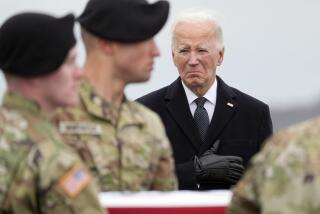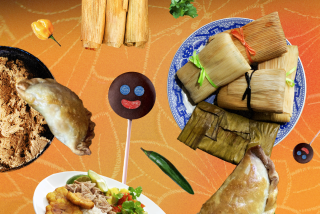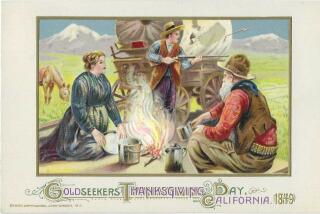Foreign contractors help U.S. soldiers celebrate Thanksgiving across Iraq
Five years ago, Vincent Lobo was working as a tobacco salesman in his native India, and had no idea what Thanksgiving was.
Now Lobo is spending a fifth year serving turkey, stuffing and candied yams to U.S. soldiers stationed in Iraq, courtesy of one of the American military’s biggest practices here -- outsourcing.
“It was a job opportunity for me to come here. I make twice as much money as I did in India, and here I can save all of my earnings,” Lobo said today, looking out over a sea of U.S. military uniforms lining up for turkey at this U.S. base in Saddam Hussein’s hometown of Tikrit.
The U.S. military puts on a traditional Thanksgiving celebration for some 165,000 military personnel stationed across Iraq. The cost is in the “hundreds of thousands of dollars” at this dining hall alone -- one of three facilities at this base north of Baghdad, said Chief Warrant Officer William Duff, who oversees contractors here.
That pays for turkey and all the trimmings for about 20,000 customers who include U.S. military members, contractors and an occasional visiting journalist.
The gymnasium-sized facility was decorated with red, orange and brown paper streamers. Each long table was topped with a watermelon carved in the shape of a basket, filled with grapes and squash.
At the center of the room was a giant “horn of plenty” -- a huge bread basket made of dough and glazed with gelatin. Ice sculptures sat on either side of a meat-carving station, in the fast-melting shapes of Native American busts in feather headdresses.
For soldiers across Iraq, it’s a time to reflect on time spent away from loved ones back home, and to celebrate a tradition as American as apple pie -- which could be found at the dessert table, next to the pumpkin pie.
Sgt. Shawn Tostado, a 31-year-old member of the 44th Expeditionary Signal Battalion from Sacramento, Calif., said this was his first Thanksgiving since his mother died in August.
“This is the first holiday I’ve had without her. This is my extended family now,” Tostado said, gesturing to his fellow soldiers at Camp Speicher in Tikrit. “I do more with these guys than anyone else.”
“I’ve gotta say, these deployments are harder on the family back home I think, celebrating the holidays without us. We’re busy here constantly, but they worry,” he said.
Spc. Kevin Lipinski, a member of the 59th Military Company who trains Iraqi police in Baghdad, went without sleep on Wednesday as he spent the day trying to get back to his base in a southeastern area of the capital in time for Thanksgiving after a week of medical treatment in Germany. He suffered hearing loss following a mortar attack.
“I just really wanted to get home to my unit,” said the 27-year-old from Elgin, Ill. “They’re the closest thing to family we have out here.”
But for this facility’s 285 workers -- all so-called “third country nationals” or TCNs -- Thanksgiving is an American experience they’ve learned to celebrate in, of all places, Iraq.
“Americans eat a lot of turkey. Actually they eat a lot of everything now that I think about it,” joked Gayan Thusitha, a Sri Lankan native who has spent more than three years here.
Thusitha and Lobo work for a subcontractor for KBR Services, a Houston-based company that has a multibillion dollar contract to provide food, laundry and other services to U.S. troops overseas. The men said they answered advertisements in local newspapers back home for food industry jobs in Iraq and ended up here a few months later. A manager for their company, subcontracted to KBR, asked that the company’s name not be published.
Some contractors in Iraq have come under criticism for allegedly paying TCNs -- most of them from India, Sri Lanka and Bangladesh -- a meager wage, while allegedly overbilling the U.S. military.
But Thusitha, Lobo and others here said they were content with their steady jobs, which pay on average about $300 a month, and happy to partake in American traditions like Thanksgiving.
“Back in 2004, I didn’t know anything about Americans and certainly not about their holidays. Now I’ve learned so much about U.S. culture,” said 25-year-old Thusitha, who is from Sri Lanka’s capital, Colombo.
More to Read
Start your day right
Sign up for Essential California for news, features and recommendations from the L.A. Times and beyond in your inbox six days a week.
You may occasionally receive promotional content from the Los Angeles Times.







